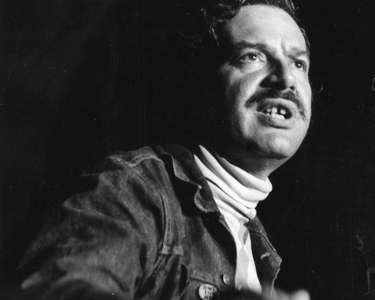Jews for Jesus Founder Moishe Rosen Dies at 78
 The man considered the “godfather of Jewish evangelism” has died.
The man considered the “godfather of Jewish evangelism” has died.
Moishe Rosen, founder of Jews for Jesus (JFJ), died Wednesday in San Francisco after a long battle with prostate cancer. He was 78.
Since it was founded in 1973, JFJ has been a leader in Jewish evangelism, with thousands of Jews embracing faith in Jesus as Messiah because of the ministry. It employs more than 200 missionaries in 11 nations and has distributed more than 50 million gospel tracts to date.
“More than any other single person, Moishe has been responsible for putting the idea of being Jewish and believing in Jesus on the map,” JFJ board member Lon Solomon told Charisma last year. “He has inspired several generations of young Jewish men and women to have a burden to reach their own people. He has been a marvelous example.”
“Moishe Rosen has had a tremendous influence on the field of Jewish missions, on the church and on so many who have sought to serve God in making the gospel known,” added current JFJ executive director David Brickner. “He was an example to me of many things, but particularly of courage, of curiosity and commitment.”
Reared in Denver, the son of Jewish immigrants from Eastern Europe, Rosen accepted Christ in 1953 along with his wife, Ceil. A short time later he sensed a call to ministry and after attending seminary at Northeastern Bible College in New Jersey, he was ordained at Trinity Baptist Church in Wheat Ridge, Colo., in 1967.
He spent the next five years working with the American Board of Missions to the Jews, now called Chosen People Ministries, before founding Jews for Jesus in 1973 with young Messianic Jews who had embrace Jesus as Messiah during the Jesus movement.
Jews for Jesus became known for distributing evangelistic literature called broadsides on college campuses, in shopping areas and on busy city streets, where missionaries used them to strike up conversations with passers-by. Rosen also encouraged the development of Jewish gospel music groups and drama teams.
“[Rosen] was a dynamic and creative witness,” said Dr. Vernon Grounds, president emeritus of Denver Conservative Baptist Seminary. “When Moishe Rosen came into a city there was either a revival or a riot.”
Because of its emphasis on direct Jewish evangelism, the ministry has faced constant rejection, hostility and lawsuits. In one prominent case, comic Jackie Mason sued after his picture appeared on a JFJ tract in 2006. The ministry withdrew the image after an apology.
Yet the organization hasn’t suffered, and Rosen is credited with training many of the current leaders in Jewish evangelism. Rosen also consulted numerous denominations and ministries in Jewish evangelism, and served as a special consultant to the Lausanne Committee on World Evangelizations study group on reaching Jewish people.
He became a founding leader of the organization it spawned, The Lausanne Consultation on Jewish Evangelism, an umbrella group for Jewish mission organizations worldwide. In 1986, Rosen was awarded an honorary Doctor of Divinity degree from Western Conservative Baptist Seminary in Portland, Ore., where he served on the board of trustees.
“Moishe Rosen championed the refreshing realization that one can be a Jew for Jesus while retaining one’s cultural heritage,” said Dr. Mark Bailey, president of Dallas Theological Seminary. “He has inspired and instructed many of us in the rich history of the Hebrew Scriptures and the Jewish foundations of our faith.”
Rosen stepped down as JFJ executive director in 1996 but remained a visible part of the ministry. Despite his leadership strengths, some criticized his style as overbearing or authoritarian. There were enough critics who viewed Rosen as unkind that in 2004 he posted a letter on JFJ’s Web site apologizing to anyone he had offended.
“It’s true,” Rosen said of his aggressive nature in an interview with Charisma late last year. “Most people who are in charge of things—you will come up against them. Those are things about my personality, but it didn’t stop me from doing what I needed to do.” (Read Charisma‘s recent profile of Rosen, “The Godfather of Jewish Evangelism.”)
As he approached the end of his life, Rosen lamented the fact that many ecumenical ministries were emphasizing Christian-Jewish relations at the expense of Jewish evangelism. In an interview with Charisma, he cited the International Fellowship of Christians and Jews, which raises more than $80 million a year, 10 times as much as Chosen People’s evangelistic outreach.
“I never thought I would live to see the day when those who know the Lord and are born again were supporting the efforts of rabbis who, frankly, not only don’t know Christ, but don’t want to know Him,” Rosen wrote in a farewell letter designed to be read after his death.
“To be an honest ministry, it can only come from the Holy Spirit; and the Holy Spirit can only indwell those who have the new birth and are born again,” Rosen added. “Therefore, I would urge you to think very seriously before you support any ‘ministry’ that involves Jewish people and doesn’t actually bring the gospel to the Jews.”
He also expressed concern about Messianic leaders who felt their calling was to promote Jewishness and Judaism to Jews. “I hope I can count on you to show love and respect for the Jewish people, but Jewishness never saved anybody,” he wrote. “Judaism never saved anybody no matter how sincere.”Â
In his letter, Rosen said he felt he left many things undone but said “anything done for Christ will last.”
Rosen is survived by his wife of 60 years, Ceil; his brother, Don; daughters Lyn Bond and Ruth Rosen, son-in-law Alan Bond, and two grandchildren, Asher and Bethany Bond.
A memorial service will be held at 2 p.m. June 1 at First Baptist Church in San Francisco.














































